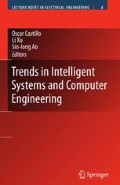Particle swarm optimization (PSO) is an algorithm for swarm intelligence based on stochastic and population-based adaptive optimization inspired by social behavior of bird flocks and fish swarms [5, 10].
To demonstrate the effectiveness of the proposed EPSO method, computer experiments on a two-dimensional optimization problem are carried out. We show experimental results, confirm the characteristics of dependency on initial conditions, and analyze the resulting PSO models.
The rest of the chapter is organized as follows. Section 5.2 briefly describes the original PSO and RGA/E. Section 5.3 presents the proposed EPSO method and a key idea about the temporally cumulative fitness that we used in the method. Section 5.4 discusses the results of computer experiments applied to a two-dimensional optimization problem and Sect. 5.5 gives conclusions.
Access this chapter
Tax calculation will be finalised at checkout
Purchases are for personal use only
Preview
Unable to display preview. Download preview PDF.
References
Bergh F and Engelbrecht AP (2001) Effects of swarm size on cooperative partical swarm optimisers. Proceedings of the Genetic and Evolutionary Computation Conference (GECCO2001), Morgan Kaufmann, San Francisco, CA, 892–899
Beielstein T, Parsopoulos KE, and Vrahatis MN (2002) Tuning PSO parameters through sensitivity analysis, Technical report of the Collaborative Research Center 531 Computational Intelligence CI-124/02, University of Dortmund
Carlisle A and Dozier G (2001) An off-the-shelf PSO. Proceedings of the Workshop on Particle Swarm Optimization Indianapolis, 1–6
Dorigo M, Maniezzo V, and Colorni A (1996) The ant system: Optimization by a colony of cooperating agents. IEEE Transactions on Systems, Man, and Cybernetics-Part B, 1:1–13
Eberhart RC and Kennedy J (1995) A new optimizer using particle swarm theory. Proceedings of the Sixth International Symposium on Micro Machine and Human Science Nagoya, Japan, 39–43
Eberhart RC and Shi Y (2000) Comparing inertia weights and constriction factors in particleswarm optimization. Proceedings of the 2000 IEEE Congress on Evolutionary Computation La Jolla, CA, 1:84–88
Eshelman LJ and Schaffer JD (1993) Real-coded genetic algorithms and interval-schemata. Foundations of Genentic Algorithms Morgan Kaufman, San Mateo, CA, 2:187–202
Goldberg DE (1989) Genetic Algorithms in Search, Optimization, and Machine Learning. Addison-Wesley, Boston
Gudise VG and Venayagamoorthy GK (2003) Evolving digital circuits using particle swarm. Neural Networks. Proceedings of the International Joint Conference on Special Issue 1:468–472
Kennedy J and Eberhart RC (1995) Particle swarm optimization. Proceedings of the 1995 IEEE International Conference on Neural Networks Piscataway, NJ, 1942–1948
Kennedy J (2006) In search of the essential particle swarm. Proceedings of 2006 IEEE Congress on Evolutionary Computations, Vancouver, BC, 6158–6165
Meissner M, Schmuker M, and Schneider G (2006) Optimized particle swarm optimization (OPSO) and its application to artificial neural network training. BMC Bioinformatics 7:125–135
Parsopoulos KE and Vrahatis MN (2002) Recent approaches to global optimization problems through particle swarm optimization. Natural Computing 1:235–306
Reyes-Sierra M and Coello Coello CA (2006) Multi-objective particle swarm optimizers: A Survey of the state-of-the-art. International Journal of Computational Intelligence Research 2(3):287–308
Spina R (2006) Optimisation of injection moulded parts by using ANN-PSO approach. Journal of Achievements in Materials and Manufacturing Engineering 15(1–2):146–152
Storn R and Price K (1997) Differential evolution—A simple and efficient heuristic for global optimization over continuous space. Journal of Global Optimization 11:341–359
Zhang H and Ishikawa M (2005) A hybrid real–coded genetic algorithm with local search. Proceedings of the 12th International Conference on Neural Information Processing (ICONIP2005) Taipei, Taiwan R.O.C, 732–737
Xie XF, Zhang WJ, and Yang ZL (2002) A disspative particle swarm optimization. Proceedings of the IEEE Congress on Evolutionary Computation (CEC20020) Honolulu, 1456–1461
Author information
Authors and Affiliations
Editor information
Editors and Affiliations
Rights and permissions
Copyright information
© 2008 Springer Science+Business Media, LLC
About this chapter
Cite this chapter
Zhang, H., Ishikawa, M. (2008). Evolutionary Particle Swarm Optimization: A Metaoptimization Method with GA for Estimating Optimal PSO Models. In: Castillo, O., Xu, L., Ao, SI. (eds) Trends in Intelligent Systems and Computer Engineering. Lecture Notes in Electrical Engineering, vol 6. Springer, Boston, MA. https://doi.org/10.1007/978-0-387-74935-8_5
Download citation
DOI: https://doi.org/10.1007/978-0-387-74935-8_5
Publisher Name: Springer, Boston, MA
Print ISBN: 978-0-387-74934-1
Online ISBN: 978-0-387-74935-8
eBook Packages: EngineeringEngineering (R0)

